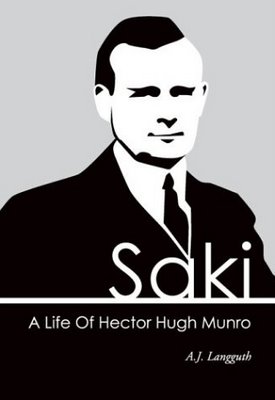Saki: A Life of Hector Hugh Munro

 Christopher Morley wrote, "There is no greater compliment to be paid the right kind of friend than to hand him Saki, without comment."
Christopher Morley wrote, "There is no greater compliment to be paid the right kind of friend than to hand him Saki, without comment."Saki was the premier satirist and story-teller of the Edwardian world of Upstairs, Downstairs. His very name, Saki - pen name for Hector Hugh Munro - evokes that era of brittle elegance.
This biography, by A. J. Langguth, which is based on the writer's papers, is the first. It is itself a hilarious and quotable narrative of that soon-to-end world of extravagance.
H. H. Munro, his sister and his brother were brought up by two bad aunts because his father was serving in India in the Army and his mother (who had been sent home to safe England to deliver her fourth child) was kicked and killed by a bull in a pasture. The combination of accidents and backgrounds seems symbolic of Hector's life - the cliche upper-middle-class background, the myth of an England always and forever safe, the fairy-tale/nightmare bad aunts and the children who fantasize in the nursery, and the absurdity of the mother's death (and all of life). Young Hector was to follow a typical path of his day, and he was to become the best of the storytellers of his age. First off to public school, then rescued by his father, then to serve the Empire in Burma, next to write from abroad for the English speaking public - from the Balkans, from Russia during the abortive 1905 uprising, from France in the anarchic days before the Great War.
In the meantime, Sake had created a character, Reginald, who epitomized the languid, arch fop of the Edwardian age, and he had produced short stories which, at their best, Evelyn Waugh called masterpieces. He had written, as well, two novels.
Munro was never to strive for epic writing but was instead a brilliant, almost perfect miniaturist who would hold a reputation roughly akin to that of Oscar Wilde, Ronald Firbank or Nathanael West. He did leave behind a brilliant and hilarious chronicle about his times; he was the most arch of the humorists of his day, a diarist of the underbelly of Edwardian society and of the macabre, which he disguised only thinly in flawless and graceful prose.
Here is Saki, the slashing wit, praised and admired by his contemporaries - Evelyn Waugh, Graham Greene, A. A. Milne, Noel Coward - in a brilliant biography as well as critique of his work.
During his research, A. J. Langguth uncovered six stories by Saki never before collected. They are included in this volume.
H. H. Munro, refusing a commission, enlisted as a private soldier in 1914. He was killed by a German sniper on November 14, 1916.
<< Home